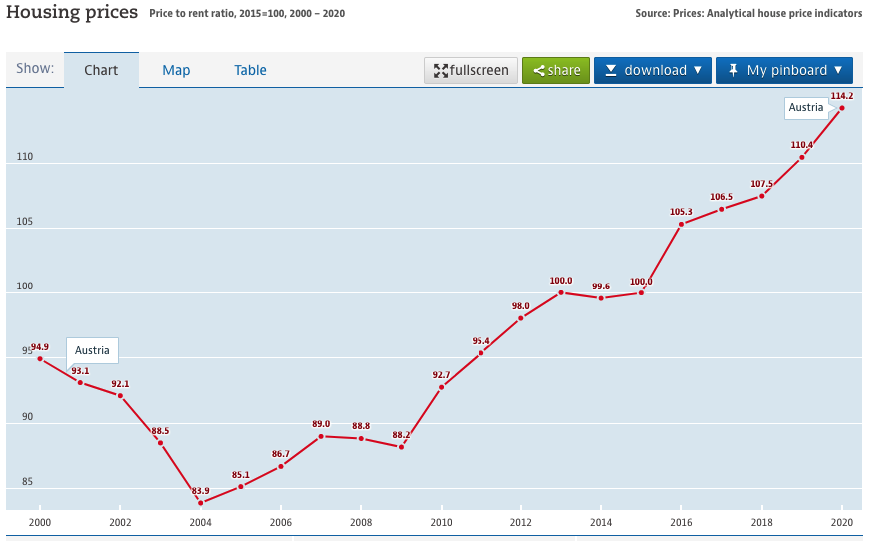There are two ways to view this question. The simplest is the rough and ready approximation that you should be willing to buy a house for about 20 times the annual rent for a comparable house. With your rent of €600/month, that works out to a fair price of about €144,000, if the place you are thinking of buying is comparable to where you live now. If the place you are thinking of buying is an upgrade to where you live now (e.g. larger or better location), you would want to substitute the market rent for the new place for your current rent, but the principle is the same. Based on this crude approximation, buying looks very expensive compared to renting.
The other way to look at it is through the lens of discounted cash flow. The idea is you take a stream of present and future costs and returns, you discount them all to get the present value (costs will be negative, and returns will be positive), and you add them all up to get the net present value, which will be negative if the costs are more than the benefits, or positive if the benefits are more than the costs.
To do this calculation you have to pick a "discount rate", which is a measure of how valuable future returns are relative to current returns. There is no single "right" value for the discount rate, but numbers like 3% or 5% are common.
You currently have a stream of monthly payments (€600 / month) that, if nothing changes, will continue indefinitely (*). You are considering buying a house that will require monthly payments of €700 / month, for 20 years, plus an up-front payment that sounds like it will be another €150,000. Finally, you will have an asset that you will someday sell, perhaps in about 30 years (or perhaps sooner, this is another thing you have to guess at).
Calculating the present value is not hard, but it's a little tedious. There are calculators that you can put data into and get an answer out, or you can do a little programming using the formulas in the article I linked above.
Still, from the numbers above we can make some guesses about how the calculation will turn out. Buying the house involves a big up front payment, plus a larger monthly payment than continuing to rent. Therefore, if your rent were static, you would have to live in the house for a considerable period after it is paid off, or the house price would have to appreciate a lot, in order to come out ahead. If your rent were to go up, then you might come out ahead sooner, but it still doesn't look promising to me. Even if your rent goes up by 5% per year, it's not until the 4th year that your rent payments would be higher than the mortgage payment you are considering. You would need some very optimistic assumptions about appreciation in order for buying to be a better deal in less than 10 years or so.
So, to summarize, the crude approximation suggests renting is the better deal. The discounted cash flow is murkier due to all the unknowns you have to guess at (now you see why people have developed approximations and rules of thumb), but it broadly seems to agree with the 5% rule. In the end it's hard to reduce a decision like this to just numbers because there are a lot of intangible factors involved in buying a house, but your intuition that home prices are very high relative to rents in your area seems broadly correct.
(*) Your rent will probably actually go up in the future, but then again, so will the value of the house you are thinking of buying. As you can see, there is a lot of estimating involved in these calculations.

